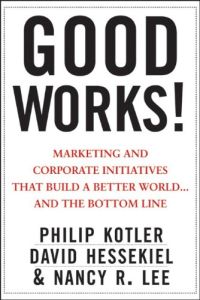Acesse a sua conta getAbstract para obter o resumo!

Acesse a sua conta getAbstract para obter o resumo!
Philip Kotler, David Hessekiel and Nancy R. Lee
Good Works!
Marketing and Corporate Initiatives that Build a Better World...and the Bottom Line
Wiley, 2012
Sobre o que é?
Corporations pay for social programs – but why?
Recommendation
David Hessekiel, Nancy R. Lee – both leading experts on marketing and social programing – and marketing guru Philip Kotler joined forces to write a practical guide to implementing effective corporate social initiatives. The authors explain what corporate social responsibility (CSR) is and how its landscape has changed over the last 20-odd years. They suggest how to establish the best relationship between your firm’s goals and the goals of a charitable campaign. Then they identify six types of initiatives and add illustrative case studies to show how each one works. The examples are interesting, relatable and moving. getAbstract recommends this guide to marketing executives, PR representatives, corporate donors and nonprofit professionals. But beware: You may become so inspired that you’ll want to jump right in.
Summary
About the Authors
Philip Kotler is a marketing expert and an author. David Hessekiel is president of the Cause Marketing Forum. Nancy R. Lee is a nonprofit consultant and a social marketing campaign strategist.




































Comment on this summary